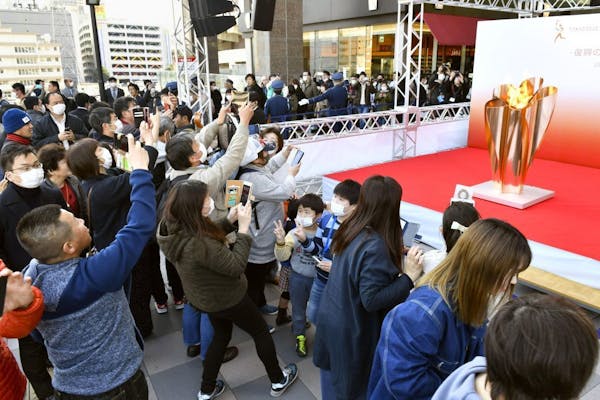Despite increasing calls to postpone this summer's Tokyo Olympics, the U.S. Olympic and Paralympic Committee insisted Friday it is too early to make a decision.
As the coronavirus continues to spread, athletes' ability to train and compete has been sharply reduced, in the U.S. and other countries. The effects of the pandemic have led some to question whether the Games, scheduled to begin July 24, should go on as planned. On Friday, USA Swimming, one of the most powerful governing bodies in the American Olympic community, sent a letter to the USOPC, urging it to advocate for a one-year postponement of the Tokyo Games.
Also late on Friday, the head of USA Track and Field joined the call to have the games postponed. CEO Max Siegel sent a two-page note to his counterpart at the USOPC, Sarah Hirshland, making s similar case for the delay.
International Olympic Committee President Thomas Bach told the New York Times on Thursday that "we are considering different scenarios," admitting that the group might be formulating contingency plans. Yet Bach continued to say it is too soon to make a decision about the Tokyo Games, scheduled for July 24-Aug. 9.
In a Friday morning conference call with reporters — and later, in a written statement responding to USA Swimming's appeal — Hirshland and chairwoman Susanne Lyons backed that stance. They said they empathize with the anxiety athletes are feeling, but they want to "ensure we aren't prematurely taking away any athletes' opportunity to compete in the Olympic and Paralympic Games" until more is known about the pandemic.
"The [IOC] believes it is premature to make a final call on the date of the Games," the statement read. "We believe we should afford them the opportunity to gather more data and expert advice before insisting that a decision be made.
"Rest assured we are making [athletes'] concerns clearly known to them. The USOPC will be leaders in providing accurate advice and honest feedback, and be unfailing advocates of the athletes and their safety."
With more restrictions put in place to slow the spread of the coronavirus, athletes are feeling the impact. Many training venues have shut down, leaving them with no swimming pools, gyms or other facilities where they can continue preparing for the Games.
The USOPC has closed both of its Olympic training centers, in Colorado Springs, Colo., and Lake Placid, N.Y. Athletes who live on site can stay, but many have left, since they cannot train there. In recent days, a number of states — including California, where hundreds of athletes are based — imposed even more limits with shelter-in-place rules that prohibit leaving home except for "essential needs."
The list of qualifying competitions that have been canceled or delayed continues to grow. Some countries, including the U.S., also are cutting back on drug testing for athletes. The U.S. Anti-Doping Agency announced its efforts will be limited to "mission-critical" testing for the time being.
USA Swimming CEO Tim Hinchey cited those burdens in a letter released Friday afternoon, calling on the USOPC to push for a one-year postponement of the Tokyo Games.
"We have watched our athletes' worlds be turned upside down and watched them struggle to find ways to continue to prepare and train," Hinchey wrote. "The right and responsible thing to do is to prioritize everyone's health and safety. … This is a solution that provides a concrete path forward and allows all athletes to prepare for a safe and successful Olympic Games in 2021.
"We urge the USOPC, as a leader within the Olympic movement, to use its voice and speak up for the athletes."
Several current and former Olympic athletes also have begun calling for the Tokyo Games to be postponed. Six-time Olympic hockey player Hayley Wickenheiser of Canada, a member of the IOC's athletes commission who is in medical school, called it "insensitive and irresponsible" for the IOC to insist the Olympics would go on as planned. Former Duluth resident Kara Goucher, a two-time Olympian in track and field, wrote Thursday on Twitter that the IOC should postpone and "stop putting athletes at risk."
Hirshland and Lyons said the athletes' health and safety — and that of their communities — is the USOPC's primary concern. In Friday's call, Hirshland emphasized that athletes should continue training only if it is safe to do so. Lyons added the organization would not "send athletes into harm's way" if it believed it was not safe to go to Tokyo.
According to Hirshland, the USOPC is "planning for different outcomes" as the coronavirus spreads. She expects disruptions to training and qualifying events will continue to be "significant," and she added that the USOPC is committed to ensuring athletes a fair qualifying process if the Olympics are held as scheduled. The USOPC also is expanding access to mental health support for athletes struggling to cope.
Lyons said the IOC has not yet disclosed any contingency plans.
"We're doing an enormous amount of scenario planning, trying to be as prepared as we can be," Hirshland said. "It is our hope that our athletes have the ability to achieve their dreams in some capacity. We're focused on Tokyo 2020, and we will continue to be as long as that possibility stays ahead of us."
The USOPC's chief medical officer, Dr. Jonathan Finnoff, the former team physician for the Timberwolves and Lynx, said Friday he knows of no U.S. athletes in Olympic sports who have tested positive for COVID-19, though one winter-sport athlete is awaiting test results. Five have been quarantined after showing symptoms or being exposed to the virus.

Want to share info with the Star Tribune? How to do it securely

'Safe recovery sites' would offer syringes, naloxone and more to people using drugs. The plan could be in peril.
New Minnesota GOP leaders seek peace with party's anti-establishment wing

Who is Republican Lisa Demuth, Minnesota's first House speaker of color?

